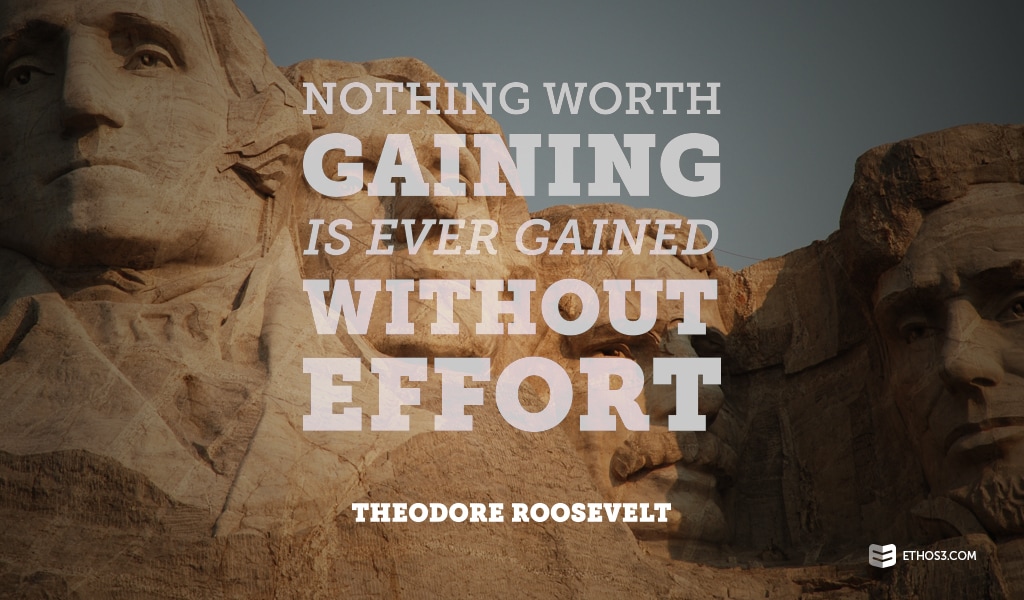As U.S. presidential election seasons end, rousing debates over political participation begins. After all, the United States does have historically low voter turnout. And the 2016 election was no different. Unofficial data shows that about half of the country’s population did not engage in the voting process. Many influential figures have spoken out about the importance of civic engagement in the days following the election of Donald Trump. But, speeches on this topic have been spoken for decades. A few years following the 1880 presidential election – one James Garfield won by about 10,000 votes – Theodore Roosevelt delivered a speech titled “Duties of American Citizenship” in Buffalo, New York. Theodore covered the theoretical and practical sides of a person’s political responsibilities in a time when the country remained politically and physically divided along Confederate and Union lines. Let’s take a look at a few of the special elements of Theodore’s speech.
“One Degree Worse”
As a member of the New York assembly at the time this speech was given, Theodore held strong opinions about those who willingly denied their civic responsibilities. Throughout his speech, he doesn’t hesitate to claim that those who disengage from politics “are unfit to live in a free community.” In poignant prose, Theodore ensures that his audience knows where he stands on the topic at hand, and the direct tone he establishes at the beginning continues throughout the entire speech. Within the first few paragraphs, he says the following:
“…the young man of means who shirks his duty to the State in time of peace as being only one degree worse than the man who thus shirks it in time of war.” – Theodore Roosevelt
While many may view this statement as blunt and harsh, a presenter owes it to his or her audience to believe passionately and unapologetically in the words said and messages communicated.

“Begin With The Little Thing”
But it isn’t always enough to outline a list of principles and ideals. Audiences need more. Theodore understood how essential actionable items and steps were to public speaking content. Here is an excerpt where Theodore introduces his main points:
“I do wish that more of our good citizens would go into politics, and would do it in the same spirit with which their fathers went into the Federal armies.” – Theodore Roosevelt
In this section of the speech, he charts a path for the individual interested in becoming political savant. Start small and put forth consistent effort. Vote in the primaries. Attend political get-togethers. Join a social club. A presenter who tirades from a glorified soapbox will provide little to no value to an audience. Adopt the lens that a presentation is the moving truck that takes all of your precious thoughts to a new destination. Listeners will cherish newfound wisdom and apply helpful tactics to their daily tasks.
“A Good American Citizen”
These are the final words in “Duties of American Citizenship.” These four words summarize the purpose of Theodore’s speech. But the phrase is more than a summary. It is a warning of things yet to come and a standard of virtue encouraged to attain. He begins the ending with this:
“In facing the future and in striving, each according to the measure of his individual capacity, to work out the salvation of our land, we should be neither timid pessimists nor foolish optimists.” – Theodore Roosevelt
Audiences crave to obtain information and stories they can tell their friends about at the next social gathering, and every other one after that. Increase the durability of your message by grounding your thoughts in very real and very present situations. Be relevant in your public speaking endeavors and leave audience members with something to fight for or believe in.
In today’s increasingly partisan climate, presenters who take public speaking opportunities and create instances for unity will garner much favor. For more speaking lessons from those who have proven expertise in the activity, read the articles below:
Lessons from History: The King’s Speech
Lessons from History: Queen Elizabeth
